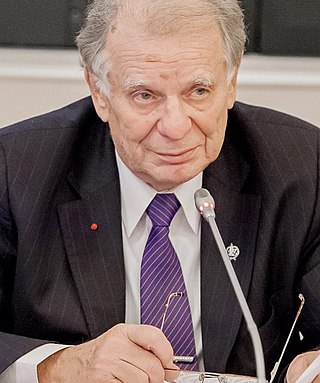
Zhores Ivanovich Alferov was a Soviet and Russian physicist and academic who contributed significantly to the creation of modern heterostructure physics and electronics. He shared the 2000 Nobel Prize in Physics for the development of the semiconductor heterojunction for optoelectronics. He also became a politician in his later life, serving in the lower house of the Russian parliament, the State Duma, as a member of the Communist Party from 1995.

The American Geophysical Union (AGU) is a 501(c)(3) nonprofit organization of Earth, atmospheric, ocean, hydrologic, space, and planetary scientists and enthusiasts that according to their website includes 130,000 people. AGU's activities are focused on the organization and dissemination of scientific information in the interdisciplinary and international fields within the Earth and space sciences. The geophysical sciences involve four fundamental areas: atmospheric and ocean sciences; solid-Earth sciences; hydrologic sciences; and space sciences. The organization's headquarters is located on Florida Avenue in Washington, D.C.

Syun-Ichi Akasofu is the founding director of the International Arctic Research Center of the University of Alaska Fairbanks (UAF), serving in that position from the center's establishment in 1998 until January 2007. Previously he had been director of the university's Geophysical Institute from 1986.

Albert Francis Birch was an American geophysicist. He is considered one of the founders of solid Earth geophysics. He is also known for his part in the atomic bombing of Hiroshima and Nagasaki.

Yevgeny Konstantinovich Fyodorov was a Soviet geophysicist, statesman, public figure, academician (1960), and Hero of the Soviet Union (1938).

Elena Petrovna Skuin was a Soviet, Russian–Latvian painter, watercolorist, graphic artist, and art teacher, lived and worked in Leningrad, a member of the Leningrad Union of Artists, regarded as one of representatives of the Leningrad school of painting, most famous for her still life painting.

Tatiana Vladimirovna Kopnina was a Soviet Russian painter and art teacher who lived and worked in Leningrad - Saint Petersburg. She is regarded as one of the representatives of the Leningrad school of painting, and is most known for her portrait paintings.
Valentina Vasilievna Monakhova is a Soviet Russian painter, watercolorist, graphic artist, and art teacher, living and working in Saint Petersburg regarded as one of representatives of the Leningrad school of painting.

Valeria Troitskaya was a Russian geophysicist who is known for her work on Ultra Low Frequency (ULF) waves.

Olga Borisovna Bogaevskaya was a Russian Soviet painter and graphic artist, who lived and worked in Saint Petersburg - Petrograd - Leningrad. She was a member of the Leningrad Union of Artists, regarded as one of the leading representatives of the Leningrad School of painting.
George Edward Backus is an American geophysicist, best known for his work with J. Freeman Gilbert on inverse methods for geophysical data. He is also notably credited with advancing the dynamo theory on the origin of the Earth's magnetic field.
William M. Kaula was an Australian-born American geophysicist and professor at the University of California, Los Angeles. Kaula was most notable for his contributions to geodesy, including using early satellites to produce maps of Earth's gravity. The National Academies Press called Kaula "the father of space-based geodesy". The Los Angeles Times called him "one of the leading planetary physicists of the last four decades".

Louis Byrne Slichter was an American physicist and geophysicist who directed the Institute of Geophysics at UCLA.
The year 1968 was marked by many events that left an imprint on the history of Soviet and Russian Fine Arts.

Konstantin Antonovich Petrzhak, k.N, was a Russian physicist of Polish origin, and a professor of physics at the Saint Petersburg State University.
Nina Nikolaevna Uraltseva is a Russian mathematician, a professor of mathematics and head of the department of mathematical physics at Saint Petersburg State University, and the editor-in-chief of the Proceedings of the St. Petersburg Mathematical Society. Her specialty is the study of nonlinear partial differential equations.

Stephen J. Mackwell is a researcher in geophysics, specializing in laboratory-based studies of the physical, chemical and mechanical properties of geological materials. He is also interested in the transport of fluid components in mantle and crustal rocks on the microscopic and macroscopic scales, and on the effects of such components on mechanical properties. He has authored or co-authored over 80 articles in international scientific journals and is an editor of a book on comparative climatology of terrestrial planets published by the University of Arizona Press.
Tatiana Krasnoselskaia was a botanist specializing in plant physiology from the Russian Empire and later the Soviet Union.

Victor Robertovich Bursian was a Soviet scientist who worked on theoretical physics, geophysics, electricity and thermodynamics, crystal physics, and the theory of electrical resistivity tomography.

Elena Yanovskaya is a Soviet and Russian mathematician and economist known for her contributions to cooperative game theory.













